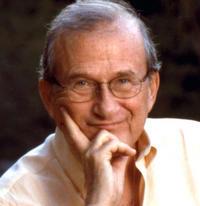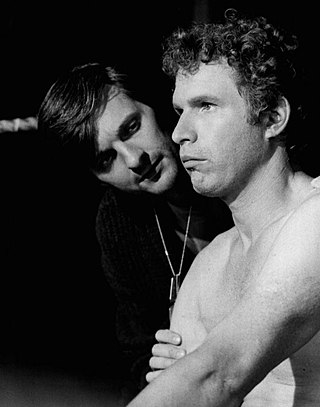Related Research Articles

Larry Simon Gelbart was an American television writer, playwright, screenwriter, director and author, most famous as a creator and producer of the television series M*A*S*H, and as co-writer of the Broadway musicals A Funny Thing Happened on the Way to the Forum and City of Angels.

M*A*S*H is an American war comedy drama television series that aired on CBS from September 17, 1972, to February 28, 1983. It was developed by Larry Gelbart as the first original spin-off series adapted from the 1970 feature film M*A*S*H, which, in turn, was based on Richard Hooker's 1968 novel MASH: A Novel About Three Army Doctors. The series, produced by 20th Century Fox Television for CBS, follows a team of doctors and support staff stationed at the "4077th Mobile Army Surgical Hospital" in Uijeongbu, South Korea, during the Korean War (1950–53).

M*A*S*H is an American media franchise consisting of a series of novels, a film, several television series, plays, and other properties, and based on the semi-autobiographical fiction of Richard Hooker.
"Chief Surgeon Who?" is the fourth episode of the television series M*A*S*H.
"The Moose" is an episode of the television series M*A*S*H. It was the fifth episode broadcast and aired on October 15, 1972, and repeated May 27, 1973. It was written by Laurence Marks and directed by Hy Averback.
"Yankee Doodle Doctor" is an episode of the television series M*A*S*H. It was the sixth episode broadcast and aired on October 22, 1972, and it was rerun April 8, 1973. It was written by Laurence Marks and directed by Lee Philips.
"Goodbye, Farewell and Amen" is a television film that served as the series finale of the American television series M*A*S*H. The 2½-hour episode first aired on CBS on February 28, 1983, ending the series' original run. The episode was written by eight collaborators, including series star Alan Alda, who also directed. As of 2024, it remains the most-watched single episode of any television series in U.S. history, and for twenty-seven years was the most-watched single broadcast in television history.
"Cowboy" was the eighth episode of the M*A*S*H television series. Originally shown on November 12, 1972 and repeated May 6, 1973, it was written by Bob Klane and directed by Don Weis. It is the only first-season episode listed in TV Guide as a "classic episode".
"The Ringbanger" was the 16th episode of the first season of the TV series M*A*S*H. It originally aired on January 21, 1973.
"Sometimes You Hear the Bullet" is the 17th episode of the first season of the TV series M*A*S*H, originally airing on January 28, 1973. This is the first episode in which the medical staff failed to save a wounded soldier, and one of the first episodes of the series showing a member of the hospital staff truly affected by death.
"The Longjohn Flap" is the 19th episode of the first season of the TV series M*A*S*H. It originally aired on February 18, 1973, and was the first episode of M*A*S*H to be written by series star Alan Alda.
"Sticky Wicket" is the 21st episode of the first season of the TV series M*A*S*H. written by Richard Baer with the teleplay written by Laurence Marks and Larry Gelbart, it originally aired on CBS-TV on March 4, 1973.
"Major Fred C. Dobbs" is the 22nd episode of the first season of the TV series M*A*S*H. It originally aired on March 11, 1973.
"Showtime" was the 24th episode of the first season of the American television series M*A*S*H. It originally aired on March 25, 1973.
"Abyssinia, Henry" is the 72nd episode of the M*A*S*H television series and the final episode of the series' third season. It was written by Everett Greenbaum and Jim Fritzell, and it first aired on March 18, 1975. The episode is notable for its shocking ending, in which the unit's amiable commanding officer Lieutenant Colonel Henry Blake receives an honorable discharge and leaves for home but, in the final scene, is reported killed by enemy fire. This ending prompted more than 1,000 letters to series producers Gene Reynolds and Larry Gelbart, and drew fire from both CBS and 20th Century Fox.
"5 O'Clock Charlie" was the 26th episode of the M*A*S*H television series, and second of season two. The episode aired on September 22, 1973.
"Radar's Report" was the 27th episode of M*A*S*H, and third of season two. The episode aired on September 29, 1973.
"Dear Dad... Three" is the ninth episode of the second season of the American television series M*A*S*H, and the 33rd episode overall. The episode's title follows the format of two episodes from the show's first season: "Dear Dad" and "Dear Dad...Again". "Dear Dad... Three" aired on November 10, 1973.

"Requiem for a Lightweight" is the third episode of the television series M*A*S*H. It was first aired on October 1, 1972 and was repeated on December 31, 1972, the first episode of M*A*S*H to do so. In Watching M*A*S*H, Watching America, a sociological examination of M*A*S*H as an illustration of shifting American values in the 1970s and early 1980s, James H. Wittebols cites this episode as an example of the sexual humor which was common in early M*A*S*H episodes, but downplayed later in the program's history.
References
- 1 2 Wittebols, James H. (2003). Watching M*A*S*H, Watching America: A Social History of the 1972-1983 Television Series. Jefferson, North Carolina: McFarland. p. 236. ISBN 0-7864-1701-3.
- ↑ "Episode Guide". TV Guide. Retrieved May 15, 2009.
- ↑ "The Classic Sitcoms Guide: M*A*S*H". classicsitcoms.com. Archived from the original on July 23, 2011. Retrieved May 15, 2009.
- ↑ "M*A*S*H: Season One (Collector's Edition) (1972)". Digitallyobsessed.com. Archived from the original on June 13, 2011. Retrieved May 17, 2009.
- ↑ Reiss, David S. (1983). M*A*S*H: the exclusive, inside story of TV's most popular show. Bobbs-Merrill. ISBN 0-672-52656-5.
- ↑ Suzy, Kalter (1988). Complete Book of Mash. New York: H.N. Abrams. ISBN 0-8109-8083-5.